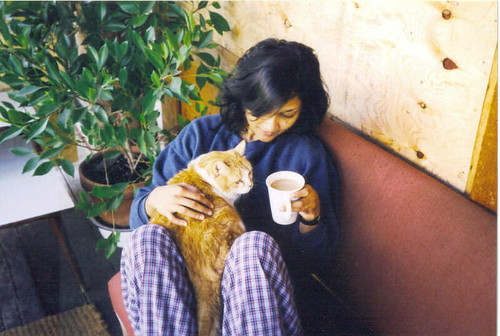Wintersmith
Wintersmith
by Terry Pratchett
The third book in the Tiffany Aching series, Wintersmith is a delightful read, as always, narrating the story of what happened when almost-13-year-old Tiffany felt the urge to dance.
Not any old dance, not an ordinary girlish frolic, easily indulged and without much consequence, with a village friend. No. She steps into the Summer Lady's spot where the Wintersmith has tangoed with her for eternity in the Dance of the Seasons.
I met Tiffany in Wee Free Men. At 9, she didn't like not being the youngest and didn't like having to babysit her brother, but, willingly stepped into Fairyland armed with a frying pan to retrieve her brother from the Queen of the Fairies.
At 11, in A Hat Full of Sky, Tiffany's entry into witch-hood (witchdom?) was quite dramatic, thanks to the hiver that takes over her as it had taken over thousands before, only to destroy them in the end. Tiffany's successful apprenticeship and return to Chalk, her home, etched her in my mind.
And now, at 13, she has done it again. Only, she didn't know what she had done. Or how to undo it. Can Granny Weatherwax and the Nac Mac Feegles help her out once again before the world freezes over?
It is no secret that I keep going back to Pratchett's books for his writing. Out of context, and randomly quoted, his words may seem just bits of frivolous indulgence, possibly funny but not all that deep. However, when taken in with his wisdom and commentary on human nature, his words simply stagger my mind. I wonder, did he just set out to write that sentence as it is and just type it out? Or did he write down the idea, scratch and polish over time to get that perfectly shining sentence conveying exactly what it does at face-value but much more as the mind unfolds it in its unique way?
The summary of Wintersmith is simple: Tiffany makes the mistake of dancing with the Wintersmith who mistakes her for the Lady of Summer and is immediately smitten with her. He follows her with his iciness and freezes the world for her to be his. But when the wee lambs are dying of cold and the world feels doomed to chillness forever, Tiffany manages to take charge. She finds a way to reunite the Summer Lady and the Wintersmith and bring Spring back to the world.
Tiffany, like any 13-year old, initially loves the attention from the Wintersmith, but her Third Thoughts tell her it is not right. Her Second Thoughts wonder why she likes the attention. Her First Sight sees little Tiffanys in the snowflakes and wonders if that is the worst thing that can happen to embarrass her.
And what about Roland? Sure, she incidentally rescued him from the Queen of Fairies when she got her brother back, but, is he as dense as she had assumed? Does he hold a torch for her? If so, does she care? And if she does, will she do anything about it? Other than curtsy and make him nervous?
We learn a lot more about Tiffany, the Feegles, their Kelda Jeannie, and the sorority of witches and how they keep a watch on each other.
Rob Anybody, with Daft Wullie and the Feegles, are irrepressible and rather adorable. The Scots conversations are a treat to read, the characters forming clearly even as they are clumped together as a clan of little blue men who love to steal and drink and fight.
Just because the protagonist is a young adult, the book itself is not just for the Young Adult. In fact, there are very few Pratchett books that I think the young adult would experience at a depth that age/experience/wisdom allows.
[image source: terrypratchett.co.uk]
by Terry Pratchett
The third book in the Tiffany Aching series, Wintersmith is a delightful read, as always, narrating the story of what happened when almost-13-year-old Tiffany felt the urge to dance.
Not any old dance, not an ordinary girlish frolic, easily indulged and without much consequence, with a village friend. No. She steps into the Summer Lady's spot where the Wintersmith has tangoed with her for eternity in the Dance of the Seasons.
I met Tiffany in Wee Free Men. At 9, she didn't like not being the youngest and didn't like having to babysit her brother, but, willingly stepped into Fairyland armed with a frying pan to retrieve her brother from the Queen of the Fairies.
At 11, in A Hat Full of Sky, Tiffany's entry into witch-hood (witchdom?) was quite dramatic, thanks to the hiver that takes over her as it had taken over thousands before, only to destroy them in the end. Tiffany's successful apprenticeship and return to Chalk, her home, etched her in my mind.
And now, at 13, she has done it again. Only, she didn't know what she had done. Or how to undo it. Can Granny Weatherwax and the Nac Mac Feegles help her out once again before the world freezes over?
It is no secret that I keep going back to Pratchett's books for his writing. Out of context, and randomly quoted, his words may seem just bits of frivolous indulgence, possibly funny but not all that deep. However, when taken in with his wisdom and commentary on human nature, his words simply stagger my mind. I wonder, did he just set out to write that sentence as it is and just type it out? Or did he write down the idea, scratch and polish over time to get that perfectly shining sentence conveying exactly what it does at face-value but much more as the mind unfolds it in its unique way?
The summary of Wintersmith is simple: Tiffany makes the mistake of dancing with the Wintersmith who mistakes her for the Lady of Summer and is immediately smitten with her. He follows her with his iciness and freezes the world for her to be his. But when the wee lambs are dying of cold and the world feels doomed to chillness forever, Tiffany manages to take charge. She finds a way to reunite the Summer Lady and the Wintersmith and bring Spring back to the world.
Tiffany, like any 13-year old, initially loves the attention from the Wintersmith, but her Third Thoughts tell her it is not right. Her Second Thoughts wonder why she likes the attention. Her First Sight sees little Tiffanys in the snowflakes and wonders if that is the worst thing that can happen to embarrass her.
And what about Roland? Sure, she incidentally rescued him from the Queen of Fairies when she got her brother back, but, is he as dense as she had assumed? Does he hold a torch for her? If so, does she care? And if she does, will she do anything about it? Other than curtsy and make him nervous?
We learn a lot more about Tiffany, the Feegles, their Kelda Jeannie, and the sorority of witches and how they keep a watch on each other.
Rob Anybody, with Daft Wullie and the Feegles, are irrepressible and rather adorable. The Scots conversations are a treat to read, the characters forming clearly even as they are clumped together as a clan of little blue men who love to steal and drink and fight.
Just because the protagonist is a young adult, the book itself is not just for the Young Adult. In fact, there are very few Pratchett books that I think the young adult would experience at a depth that age/experience/wisdom allows.
[image source: terrypratchett.co.uk]
Labels: book review, fiction, Terry Pratchett, TiffanyAching



0 Comments:
Post a Comment
<< Home